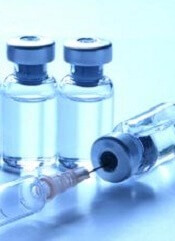
SAN DIEGO—In a now-terminated phase 3 trial, a novel anticoagulant system proved about as effective as an established drug in patients undergoing percutaneous coronary intervention (PCI).
The system also conferred higher rates of bleeding and prompted more allergic reactions.
The trial, known as REGULATE-PCI, was designed to compare the Revolixys Kit (also known as the REG-1 Anticoagulation System) to bivalirudin (Angiomax).
The study was officially halted in August due to an excess of severe allergic reactions associated with the Revolixys Kit. Given the early termination, investigators said the data should be considered exploratory.
Roxana Mehran, MD, of Mount Sinai Hospital in New York, New York, presented the study’s results at the American College of Cardiology’s 64th Annual Scientific Session (abstract 402-12).
The goal of the REGULATE-PCI trial was to compare the reversible thrombin inhibitor bivalirudin to the Revolixys Kit—a 2-component system consisting of pegnivacogin, an anticoagulant aptamer targeting coagulation factor IXa, and its complementary oligonucleotide active control agent, anivamersen—in patients undergoing PCI.
Before the trial was stopped, 3232 patients were enrolled. They underwent PCI at 225 hospitals in 17 countries. Patients were equally randomized to the bivalirudin or Revolixys arms, and investigators collected data at 3 days and 30 days.
Efficacy and safety results
There were no differences between the treatment arms in terms of the study’s primary efficacy endpoint—a composite of all-cause death, heart attack, stroke, or urgent revascularization.
The endpoint occurred in 6.7% of patients in the Revolixys arm and 6.4% of patients receiving bivalirudin 3 days after PCI (P=0.72). Efficacy was still comparable at 30 days.
In addition, the Revolixys system failed to show a benefit over bivalirudin with regard to the primary safety endpoint of bleeding.
The rate of BARC 3 or 5 bleeding was 0.4% in the Revolixys arm and 0.1% in the bivalirudin arm (P=0.09). And the rates of BARC 2, 3, or 5 bleeding were 6.5% and 4.1%, respectively (P=0.002).
Serious allergic reactions occurred in 10 of 1605 patients in the Revolixys arm. One of these reactions was fatal, and the others were anaphylactic reactions. Only one patient in the bivalirudin group had a serious allergic event.
“This anticoagulant system is associated with infrequent but an unacceptably high rate of severe allergic reactions,” Dr Mehran said.
Research is ongoing to determine the exact cause of the allergic reactions, and Dr Mehran said she hopes this does not deter the search for novel anticoagulants for use in this patient population.
More about REGULATE-PCI
Investigators started recruiting patients to the trial in September 2013. In April, because there were a handful of allergic reactions seen in the earlier phase 2 trial, a data safety and monitoring board reviewed all of the safety endpoints for the first 1000 patients enrolled in REGULATE-PCI.
In June, both the executive committee and the sponsor decided to suspend the trial, and the US Food and Drug Administration announced a clinical hold in July. The trial was permanently halted in August.
This study was funded by Regado Biosciences Inc., the company developing the Revolixys kit. Dr Mehran has served on the scientific advisory board for Regado Biosciences.


